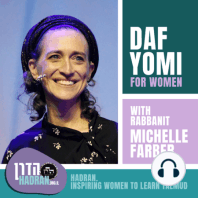44 min listen
Ketubot 54 - August 29, 2 Elul
ratings:
Length:
47 minutes
Released:
Aug 29, 2022
Format:
Podcast episode
Description
Today's daf is sponsored by Leah Brick in loving memory of her great niece, Nava Tova, who was named after her mother, daughter of Liora and Josh Cherney. "Bet Elul would have been her first birthday. May her memory be a comfort to her parents." Do the following women receive sustenance from their father's estate: the daughter born to a couple who is forbidden by rabbinic law to be married (shniyot l'arayot), the daughter born to a couple who was betrothed, and the daughter born to a woman who was married to the man who raped her? A stipulation of the ketuba is that the woman be able to reside in the house of the husband even after his death. Since the language used is a "house," they derive that if the heirs live in a hut, they are not required to have her live with them. Does this also mean that they are not required to sustain her in that case? There are various opinions brought regarding how it is determined when the orphans no longer need to give the widow money for sustenance. Is it from when she accepts a marriage proposal from someone else, when someone proposed but she doesn't accept it as she doesn't specifically like him, but she is interested in remarrying, when she engages in prostitution, when she puts on makeup, or when she claims her ketuba in court. In the Mishna it had stated varying customs between Jerusalem and the Galilee and Judea about whether or not the orphans could decide they no longer wanted to pay the widow's sustenance. In Babylonia different places ruled differently. Rav and Shmuel disagree regarding a widow or a hired worker about whether or not their clothing is deducted from their ketuba/salary. Rabbi Yochanan's relatives' father had a wife who ate a lot of food. They were worried that if she became widowed, it would be a drain on their inheritance so he suggested the father designate a specific piece of land for her to be used for her sustenance in the event that he die. Reish Lakish vehemently disagreed and wouldn't allow them to implement this solution as he didn't think it was effective halachically. In the end, Rabbi Yochanan modified his position. The Mishna states that one who wants to, can add money to the 200 or 100 zuz promised to the woman in the ketuba. It was necessary to state this as one may think this was limited so as not to embarrass one who is unable to add. There is a debate about whether a woman gets her ketuba money if she was widowed or divorce from a betrothal. Can the woman forgo part of the amount of her ketuba by writing that she received part of the money already, even if she really hadn't? Any additional sums committed to the wife in the ketuba or stipulations have the same status as the ketuba. What is the relevance of this?
Released:
Aug 29, 2022
Format:
Podcast episode
Titles in the series (100)
Berakhot 4: Did Moshe and King David really not know when it was midnight? It seems that they did know. If so, why did Moshe say "around midnight" and what was the need to David's harp? How was David different from other kings? How did he respond when Mefiboshet... by Daf Yomi for Women - Hadran
